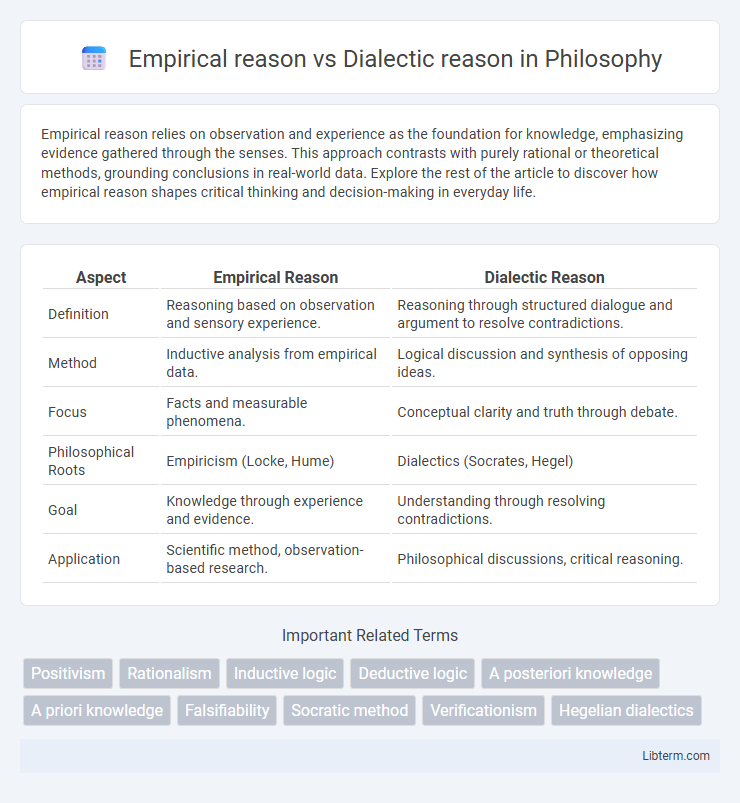Empirical reason relies on observation and experience as the foundation for knowledge, emphasizing evidence gathered through the senses. This approach contrasts with purely rational or theoretical methods, grounding conclusions in real-world data. Explore the rest of the article to discover how empirical reason shapes critical thinking and decision-making in everyday life.
Table of Comparison
| Aspect | Empirical Reason | Dialectic Reason |
|---|---|---|
| Definition | Reasoning based on observation and sensory experience. | Reasoning through structured dialogue and argument to resolve contradictions. |
| Method | Inductive analysis from empirical data. | Logical discussion and synthesis of opposing ideas. |
| Focus | Facts and measurable phenomena. | Conceptual clarity and truth through debate. |
| Philosophical Roots | Empiricism (Locke, Hume) | Dialectics (Socrates, Hegel) |
| Goal | Knowledge through experience and evidence. | Understanding through resolving contradictions. |
| Application | Scientific method, observation-based research. | Philosophical discussions, critical reasoning. |
Defining Empirical Reason
Empirical reason is grounded in observation, experience, and sensory data, relying on evidence gathered through experimentation and real-world interaction. It contrasts with dialectic reason, which is based on logical argumentation, synthesis, and critical discussion to resolve contradictions and arrive at higher truths. Defining empirical reason involves emphasizing its foundation in inductive methods and the validation of hypotheses through measurable and testable phenomena.
Understanding Dialectic Reason
Dialectic reason involves understanding through the synthesis of opposing ideas, embracing contradiction and dialogue to reach higher truths beyond mere observation. It prioritizes reasoning by examining relationships, change, and development in concepts rather than relying solely on empirical data or sensory experience. This method fosters comprehensive insight by integrating diverse perspectives, facilitating deeper cognitive progress and conceptual clarity.
Historical Development of Reasoning Approaches
Empirical reason, rooted in observation and experimentation, gained prominence during the Scientific Revolution, emphasizing inductive methods to derive knowledge from sensory experience. Dialectic reason traces back to ancient Greek philosophy, particularly Socratic and Hegelian traditions, focusing on logical argumentation and synthesis of contradictions to reveal deeper truths. The historical development of reasoning approaches reflects a shift from dialectic's abstract reasoning to empirical methods prioritizing evidence-based validation.
Key Philosophers and Their Contributions
Immanuel Kant significantly shaped empirical reason by integrating sensory experience with rational thought in his "Critique of Pure Reason," emphasizing knowledge derived from observation. G.W.F. Hegel developed dialectic reason through his method of thesis-antithesis-synthesis, stressing the evolution of ideas via contradictions and resolution. Friedrich Nietzsche critiqued both, advocating for a reevaluation of reason that transcended empirical constraints and dialectical processes toward individual creativity and perspective.
Core Principles of Empirical Reasoning
Empirical reasoning relies on observation, experimentation, and evidence gathered through the senses to form conclusions, emphasizing verification and repeatability. It prioritizes inductive logic, where specific data points lead to broader generalizations, grounding knowledge in tangible, measurable phenomena. Core principles include skepticism, systematic data collection, and reliance on empirical evidence over abstract argumentation characteristic of dialectic reasoning.
Essential Features of Dialectic Reasoning
Dialectic reasoning centers on the essential features of thesis-antithesis-synthesis, emphasizing the resolution of contradictions through critical dialogue and progressive understanding. Unlike empirical reason, which relies on sensory data and observation, dialectic reasoning prioritizes abstract thinking and the dynamic interplay of opposing ideas to achieve deeper truth. It facilitates comprehensive analysis by integrating diverse perspectives, fostering conceptual development beyond mere empirical evidence.
Comparing Methodologies: Empirical vs Dialectic
Empirical reason relies on observation, experimentation, and sensory data to formulate knowledge, emphasizing measurable and verifiable evidence. Dialectic reason employs logical argumentation and critical dialogue to resolve contradictions, seeking synthesis through thesis, antithesis, and resolution. While empirical methods prioritize inductive reasoning from data, dialectic methods focus on conceptual analysis and the evolution of ideas through discourse.
Applications in Science, Ethics, and Society
Empirical reason relies on observation and experimentation, driving scientific advancements through data collection and hypothesis testing, essential in fields like physics and biology. Dialectic reason employs critical dialogue and logical argumentation to explore ethical dilemmas and societal values, shaping moral philosophy and public policy debates. The integration of empirical evidence with dialectic reasoning enhances decision-making processes in science, ethics, and society by balancing factual accuracy with normative considerations.
Strengths and Limitations of Each Approach
Empirical reason excels in generating knowledge through observation and experiment, providing concrete, verifiable data that grounds scientific inquiry in reality but is limited by its reliance on sensory experience and inability to address abstract or metaphysical questions. Dialectic reason offers strength in exploring complex ideas and resolving contradictions through logical argumentation, enabling deep philosophical insight and synthesis of opposing views, yet it may suffer from subjective interpretation and lack direct empirical validation. Balancing empirical rigor with dialectical analysis enhances comprehensive understanding by combining evidence-based conclusions with critical conceptual evaluation.
Integrating Empirical and Dialectic Reason for Deeper Insight
Integrating empirical reason, which relies on observation and experience, with dialectic reason, based on logical dialogue and critical analysis, fosters deeper insight by combining concrete data with conceptual understanding. This synthesis enhances problem-solving by allowing evidence-based conclusions to be tested and refined through rational debate and reflection. Such an approach bridges scientific investigation and philosophical inquiry, leading to more comprehensive and nuanced knowledge.
Empirical reason Infographic

 libterm.com
libterm.com